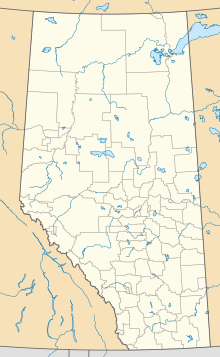Wayne, Alberta
Wayne | |
|---|---|
 Rosedeer Hotel in Wayne | |
| Coordinates: 51°22′55″N 112°39′36″W / 51.382°N 112.660°W | |
| Country | Canada |
| Province | Alberta |
| Municipality | Town of Drumheller |
| Government | |
| • Mayor | Heather Colberg |
| • Governing body | Drumheller Town Council
|
| Elevation | 695 m (2,280 ft) |
| Time zone | UTC−7 (MST) |
| • Summer (DST) | UTC−6 (MDT) |
| Area code(s) | 403, 587, 825 |
Wayne is a community within the Town of Drumheller, Alberta, Canada. It was previously a hamlet within the former Municipal District (MD) of Badlands No. 7[2] prior to the MD's amalgamation with the former City of Drumheller on January 1, 1998.[3]
Wayne is located approximately 10 km (6.2 mi) southeast of Drumheller's main townsite and 104 km (65 mi) northeast of Calgary. It lies in the Rosebud River valley and has an elevation of 695 metres (2,280 ft). It is accessed via Highway 10X from Rosedale to the north through a 150-metre-deep (490 ft) canyon in the badlands, across 11 bridges that span the Rosebud River.
Wayne is within Census Division No. 5 and was in the federal riding of Crowfoot.
Attractions
[edit]Wayne was the site of several coal mines that were closed in the 1950s. It is host to a few historic sites, including the Rosedeer Hotel.[12]
See also
[edit]References
[edit]- ^ "Municipal Officials Search". Alberta Municipal Affairs. May 9, 2019. Retrieved October 1, 2021.
- ^ "Town of Drumheller Municipal Development Plan: Volume 1 Background Study" (PDF). Town of Drumheller and Palliser Regional Municipal Services. April 21, 2008. p. 5. Retrieved October 10, 2013.
- ^ "Location and History Profile: Town of Drumheller". Alberta Municipal Affairs. October 4, 2013. Retrieved October 10, 2013.
- ^ Ninth Census of Canada, 1951 (PDF). Vol. SP-7 (Population: Unincorporated villages and hamlets). Dominion Bureau of Statistics. March 31, 1954. pp. 55–57. Retrieved October 24, 2021.
- ^ Census of Canada, 1956 (PDF). Vol. Population of unincorporated villages and settlements. Dominion Bureau of Statistics. October 25, 1957. pp. 56–59. Retrieved October 24, 2021.
- ^ "Population of unincorporated places of 50 persons and over, Alberta, 1961 and 1956". 1961 Census of Canada: Population (PDF). Series SP: Unincorporated Villages. Vol. Bulletin SP—4. Ottawa: Dominion Bureau of Statistics. April 18, 1963. pp. 63–67. Retrieved October 24, 2021.
- ^ "Population of unincorporated places of 50 persons and over, 1966 and 1961 (Alberta)". Census of Canada 1966: Population (PDF). Special Bulletin: Unincorporated Places. Vol. Bulletin S–3. Ottawa: Dominion Bureau of Statistics. August 1968. pp. 184–187. Retrieved October 24, 2021.
- ^ "Population of Unincorporated Places of 50 persons and over, 1971 and 1966 (Alberta)". 1971 Census of Canada: Population. Special Bulletin: Unincorporated Settlements. Vol. Bulletin SP—1. Ottawa: Statistics Canada. March 1973. pp. 204–207.
- ^ 1981 Census of Canada (PDF). Place name reference list. Vol. Western provinces and the Territories. Ottawa: Statistics Canada. May 1983. Retrieved November 14, 2021.
- ^ 1986 Census of Canada (PDF). Population. Vol. Unincorporated Places. Ottawa: Statistics Canada. July 1988. Retrieved November 14, 2021.
- ^ 91 Census (PDF). Population and Dwelling Counts. Vol. Unincorporated Places. Ottawa: Statistics Canada. June 1993. Retrieved November 14, 2021.
- ^ Stefanic, Cassandra (2023-09-16). "This Alberta 'ghost town' has a working saloon & hotel that you can visit this fall". Curiocity. Retrieved 2023-09-20.


